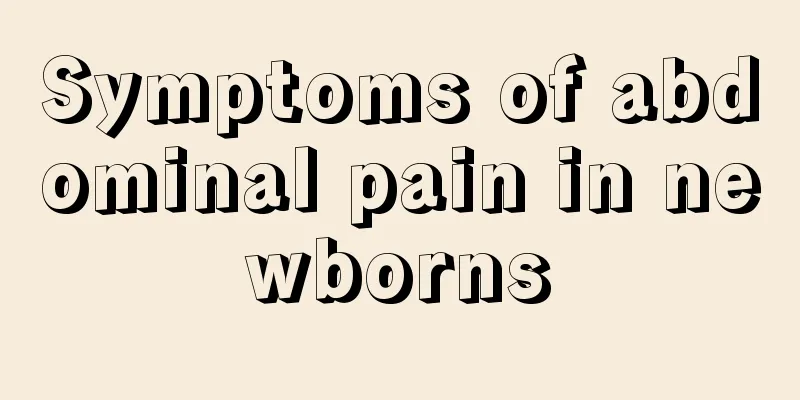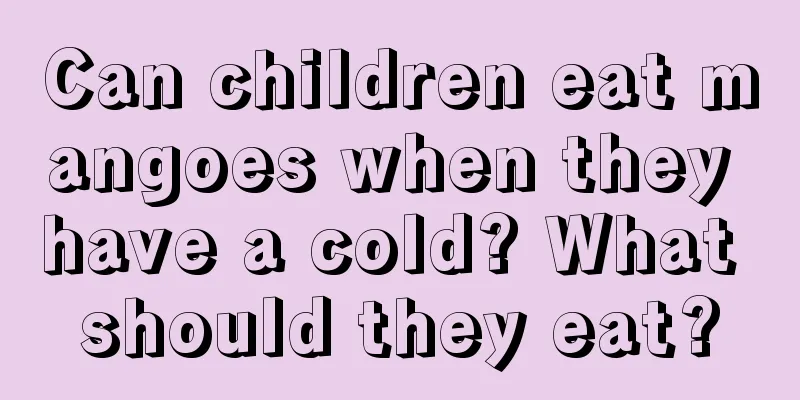Symptoms of abdominal pain in newborns

|
In life, many men and women are first-time parents, so they are very concerned about the physical health of their children. However, when newborns have physical problems, many people tend to ignore many problems due to their lack of experience. For example, if a child has a stomachache, he or she may not be able to express it verbally, but will often tell the parents through symptoms. What are the symptoms of abdominal pain in newborns? 1. It is difficult to judge whether the newborn's abdominal pain is normal crying or abdominal discomfort based on the baby's clinical symptoms alone, so it is necessary to judge based on the baby's stool characteristics and bowel sounds. Because the baby's digestive function is not very perfect, the activity of digestive enzymes is very low, and the body's defense function is poor, it is easy to have symptoms such as indigestion, diarrhea, and abdominal distension. Generally speaking, diarrhea and abdominal pain will change the shape of the baby's stool, such as thin or watery stool, yellow curds and foam, and may be mixed with a small amount of mucus. The baby may not suck the nipple and have a poor appetite. It is worth noting that the baby's crying does not necessarily mean abdominal pain. It is an unconscious reaction of the baby who has just been exposed to a new environment. It is also a way of exercise. 2. Stomachache is a common symptom of discomfort in babies. Older children can accurately describe their stomachache, such as stomachache, stomach discomfort and diarrhea, etc., and can point out the specific location of the abdominal pain. For babies who cannot express themselves, the diagnosis is mainly based on other manifestations. For example, if they have symptoms of diarrhea, nausea, or vomiting, they will have stomach pain. Suddenly crying loudly, crying non-stop, rolling over, swollen abdomen, clenched fists, raised legs, and curled abdomen, these also indicate stomach pain. It can also be judged by touching the baby's belly. For example, when a baby is crying, he likes to have his belly rubbed, and when you touch his belly and find it bloated, he refuses; when you touch his belly and find it bloated, he refuses to have his belly pressed or his crying gets worse when you press his belly, these are also manifestations of stomach pain. 3. This situation is quite common in newborns. For example, when a child wants to poop or pee, or has eczema, itching, or irritability, he or she will strain. If the child has no other discomfort, you can continue to observe. Pay attention to your baby's food intake and appetite changes, avoid colds, and avoid nipple contamination. It is best to clean the nipples before the baby eats. Carefully observe the baby's emotions and various life characteristics changes to help detect the disease early. |
<<: Premature infant feeding scale for three months
>>: How to cook duck meat for babies
Recommend
What to do if the newborn is hot-tempered?
Everyone knows that babies who eat milk powder ar...
What are the benefits of millet porridge for children?
It is beneficial for children to drink more mille...
What to do if your child vomits after eating
Nowadays, most families have only one baby, so th...
Can ADHD in children heal itself?
If children with ADHD are not treated and interve...
Symptoms and causes of baby eczema
Newborn babies need every possible care from thei...
What problems can cold baby feet cause?
When taking care of a baby, in addition to feedin...
How to treat spots on children's faces
Due to the differences in dietary structure betwe...
Is it normal for a child to have a temperature of 374?
Every child is the "treasure" of the en...
What causes red spots on children?
Every family hopes that everyone in the family is...
What should I do if my child has a fever?
We all know that children have poor physical fitn...
What kind of diapers are good to introduce
Some parents are very concerned about their child...
The baby has red pimples on his body
Anyone who has taken care of a child should know ...
The reason why there are fat particles on the baby's face
There are fat particles on the baby's face, a...
How to identify the intellectual development of babies by clenching their fists
The intellectual development of infants is a conc...
Why do children always suck their fingers?
It is very normal for babies to suck their finger...









